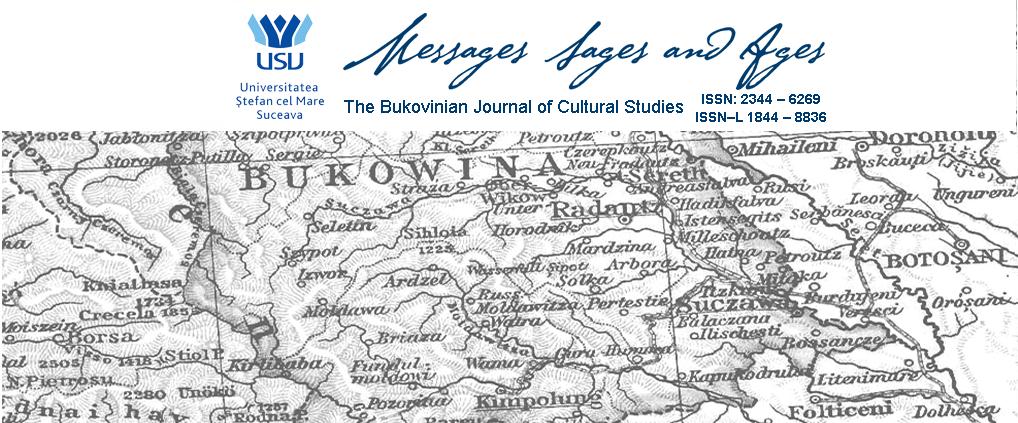Editors: Nicoleta Cinpoes & Daniela Martole
BY LOOKING LIKING: BAZ LUHRMANN S WILLIAM SHAKESPEARE S ROMEO+JULIET
Twenty years since its release onto the big screen, Baz Luhrmann’s William Shakespeare’s Romeo+Juliet continues to attract viewers, divide critics and remain unchallenged, in a league of its own, when it comes to film adaptation of Shakespeare’s plays. This article…
MATERNITY AND ABSENCE IN SHAKESPEAREAN ROMANCE
The equivocation of the private life of Elizabethan and Jacobean subjects with the public life of monarchy and state endowed mothers with an import, and therefore a power, not previously acknowledged. These changes provoked a fear of female disruption to…
ADAPTING SHAKESPEARE – CONVERTING SHYLOCK IN MICHAEL RADFORD’S THE MERCHANT OF VENICE
This article aims to explore the extension and evolution of Shakespeare’s The Merchant of Venice through Michael Radford’s 2004 cinematic adaptation. By investigating the concept of adaptation and the significance of intertextuality, Shakespeare’s source text is considered alongside Radford’s twenty-first…
THE NEW ROMANIAN SHAKESPEARE SERIES ON THE MOVE: FROM PAGE TO STAGE AND SCREEN
This article aims at presenting the impact that the New Romanian Shakespeare edition launched in 2010 by George Volceanov has had on the literati and theatres so far. It is, therefore, a stocktaking exercise and its main goal is to…
RELIGION AND CULTURAL IDENTITY IN SHAKESPEARE’S ROMEO AND JULIET AND THE MUSICAL WORKS IT INSPIRED
Protean Shakespeare thrives not only in the theatre, but also through what Bolter and Grusin call remediation. This article analyses the religious stances in the play and then shows how opera, symphony and musical have been adapting the veteran Elizabethan…
REWRITING AND APPROPRIATING FRANCESCO GUICCIARDINI’S STORIA D’ITALIA IN ELIZABETHAN ENGLAND: GEOFFREY FENTON’S TRANSLATION AND SHAKESPEARE’S HENRY V
The exploration of the multifarious ways in which cultural reworkings and translations have been involved in the transmission and circulation of various discourses, concepts and ideas in different historical periods and places, has become one of the most productive fields…
ETHNOCENTRIC TENDENCIES IN THE ROMANIAN TRANSLATIONS OF MACBETH
Starting from Venuti’s binary classification of translations into ethnocentric and foreignizing this paper focuses on the factors that trigger ethnocentric attitudes in the translation of the play Macbeth in Romanian. Counterbalancing the extremely neologist tendencies at the end of the…
REGIONAL IDENTIFICATION IN PRESENT DAY ROMANIA. THE CASE STUDY OF SUCEAVA COUNTY
In the aftermath of the 1989 Revolution, Romanian mainstream culture set out to reclaim the pre-Communist legacy of the country. The ‘golden age’ of interwar was the obvious choice; both popular and academic debates on Romanian identity looked back at…
REMEDIATING GLOBAL MEDIA IN RECENT SHAKESPEARE PRODUCTIONS ON ROMANIAN STAGES
The paper discusses recent Romanian Shakespeare productions of The Tempest and A Midsummer Night’s Dream in Bucharest. It argues that global mass culture, in the form of TV sitcoms and musicals, YouTube clips and computer games, is re-circulated on Romanian…
Messages, Sages, and Ages, Vol. 2, No. 2, (2015)
Editor: Onoriu Colacel
AN ETYMOLOGICAL PROPOSITION: OLD GERMANIC GOD-SPOD GOOD FORTUNE AS SOURCE OF OLD CHURCH SLAVONIC GOSPOD LORD, MASTER
A thorough checking of the data provided by three etymological dictionaries, namely Georgiev et al. 1971 (s.v. gospod), Vasmer 1986 (s.v. gospod) and Derksen 2008 (s.v. *gospod), would be enough to raise serious doubts about the application of the label…
THE PROBABLE OLD GERMANIC ORIGIN OF ROMANIAN iele (evil) fairies
Iele (or ielele, with a definite article) is the name of the “evil fairies” (zânele rele) of the Romanian mythology. They are mentioned in old Romanian folktales and legends and they have been a constant source of inspiration for many…
SUCEAVA ON CAMERA: THE COUNTY COUNCIL AND LOCAL SELF-IDENTIFICATION IN 21ST CENTURY ROMANIA
In post-communist Romania, regional self-identification has undergone significant change. Particularly, a paradigm shift occurred in relation to 20th century Romanian historiography (I have in mind the national communist as well as inter-war historic narratives). The literature and the promotional films…
